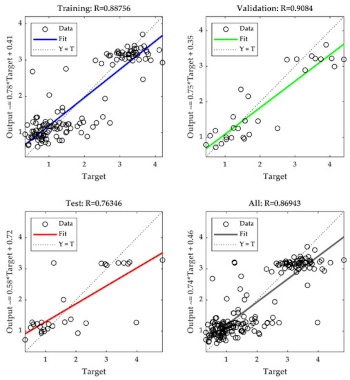
Peaches are a popular fruit appreciated by consumers due to their eating quality. Quality evaluation of peaches is important for their processing, inventory control, and marketing. Eleven quality indicators (shape index, volume, mass, density, firmness, color, impedance, phase angle, soluble solid concentration, titratable acidity, and sugar–acid ratio) of 200 peach fruits (Prunus persica (L.) Batsch “Spring Belle”) were measured within 48 h. Quality indicator data were normalized, outliers were excluded, and correlation analysis showed that the correlation coefficients between dielectric properties and firmness were the highest. A back propagation (BP) neural network was used to predict the firmness of fresh peaches based on their dielectric properties, with an overall fitting ratio of 86.9%. The results of principal component analysis indicated that the cumulative variance of the first five principal components was 85%. Based on k-means clustering analysis, normalized data from eleven quality indicators in 190 peaches were classified into five clusters. The proportion of red surface area was shown to be a poor basis for picking fresh peaches for the consumer market, as it bore little relationship with the comprehensive quality scores calculated using the new grading model.